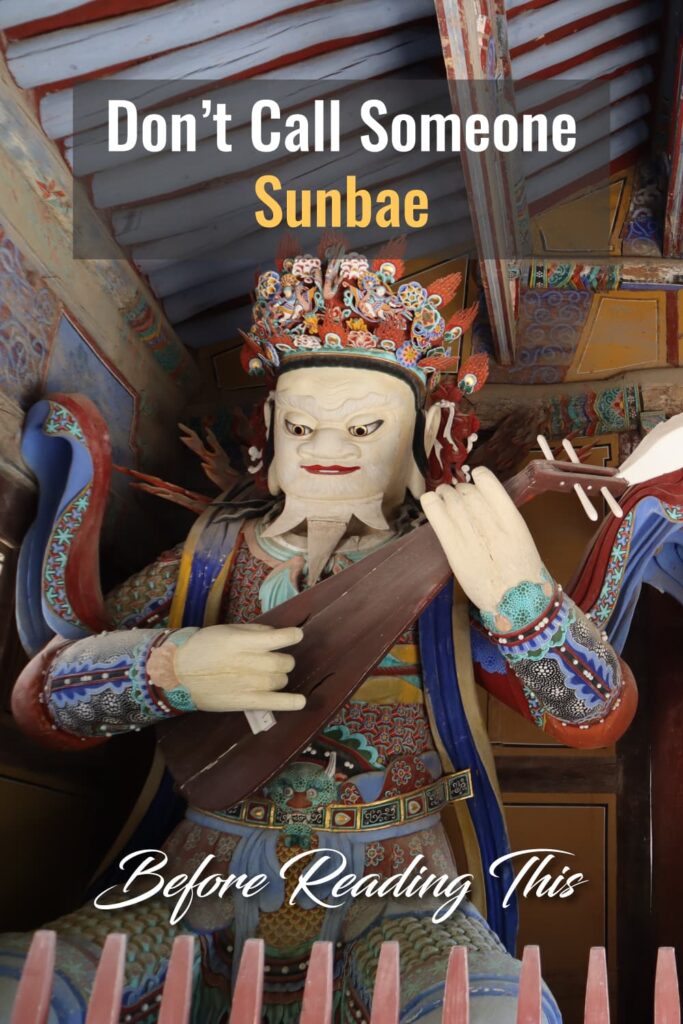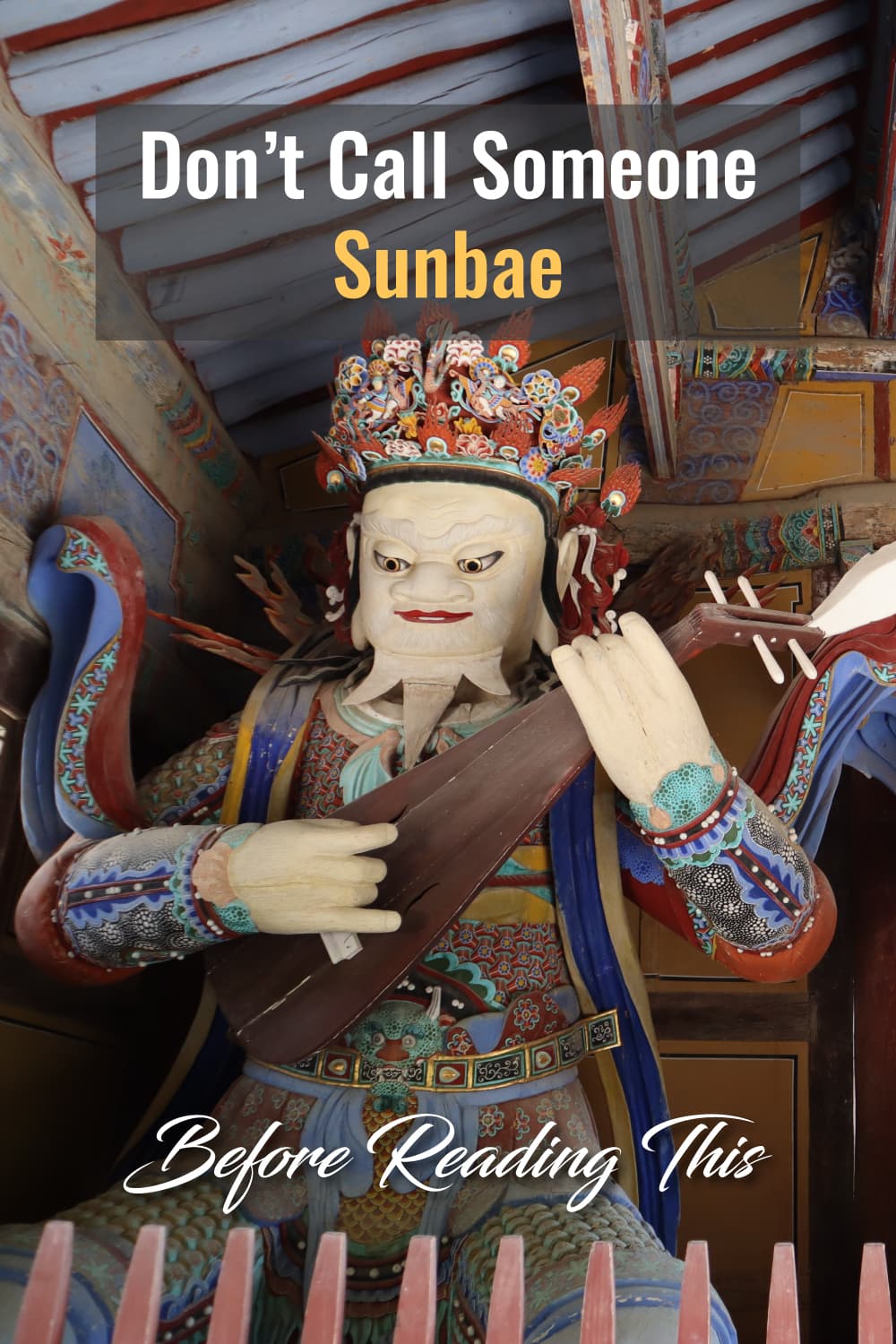Not sure when to call someone sunbae and how to treat them?
This post goes over its meaning and gives you cultural context.
You’ll learn how to use sunbae in different situations and its pros and cons.

Quick Summary
- Sunbae means a senior member of a group in Korean.
- Sunbae in Korean refers to someone in a higher grade at the same school, or someone who started their job before you did at the same company.
- Whoever debuted first is sunbae in the K-pop industry regardless of age.
What does sunbae mean in Korean?
Sunbae (선배 in hangul) is a title for someone in a higher grade at the same school, or someone who started their career or job before you did at the same company.
The most common situations when you use sunbae are:
Sunbae at College/University
Most Koreans start using the word “sunbae” in college.
As soon as Koreans enter university, they go to orientation [1] and start calling people in higher classes, “NAME sunbae-nim“. When you become friendly enough, you can drop “nim” and simply say “NAME sunbae”.
[1] Koreans refer to orientation as “OT”. It’s either mandatory or highly recommended to participate. It’s actually a 4-day trip to second location where you get to know sunbae and donggi.
Hidden Culture: Hakbeon (학번)
Hakbeon means “college entrance year” or “class of XX”.
Someone who entered uni this year would be “21학번 or ee-il-hakbeon (class of 2021)”.
- Sunbae: Anyone with higher hakbeon
- Donggi: Anyone with the same hakbeon
- Hoobae: Anyone with lower hakbeon
※ Being older doesn’t always equal being sunbae. An 8-year-old genius was sunbae to me since he entered uni before I did. Also, jaesusaeng (재수생 or someone who spends one more year studying after high school graduation to take suneung again to get into a better university) needs to call someone with higher hakbeon, sunbae, even if they’re the same age.
They usually drop honorifics after becoming friends. If your donggi is jaesusaeng, you can use unnie, oppa, hyung or noona.
Male sunbae like to hear “oppa” from female hoobae. Since oppa may sound flirty, female students might prefer calling them sunbae.
Sunbae at School
Korean elementary students use hyung, noona, unnie or oppa.
In middle and high school, Koreans use sunbae only when they join a social club. Some strict clubs with military-style rules make hoobae bow 90 degrees to their sunbae.
(We used to call some poor hoobae in a dance club, “flip phone” because they were bowing to their sunbae, almost touching the floor.)
Sunbae-hoobae relations are mostly found at elite schools with fewer students, including special-purpose (특목고) or autonomous private high schools (자사고), as well as arts (예고), physical education (체고), or specialized vocational high schools (특성화고) with frequent exchanges between sunbae and hoobae.
Sunbae at Work
Anyone who joined your company before you is sunbae.
You can call sunbae without a including a title, “NAME sunbae-nim”. If they have a title (직함), you can simply say “NAME + position + nim” like “Kim Daeri-nim”.
Similar words are:
- Sun-im (선임): Senior who’s the opposite of hoo-im (후임 or junior/successor). Sunim/seonim can be a job title as well.
- Sa-soo (사수): Direct sunbae who teaches you or your boss/coworker who also checks your work.
Sunbae in K-pop
Regardless of age, whoever debuted first is sunbae in the K-pop industry.
BIGBANG are sunbae to BTS, and 2NE1 are sunbae to BLACKPINK.
Ye-ui (예의 or courtesy) is expected by Korean fans. Some fans criticize celebrities for having a bad attitude by saying “how dare he/she do _ in front of their sunbae!” (They’re usually fans of sunbae celebrity.)
Also, Korean female models used to have the strictest military discipline until Jang Yoon-ju and Song Kyung-a ended that culture.

What are pros and cons of sunbae?
Pros
Sunbae can be super nice. They buy you meals and drinks, and give you jokbo (족보 or tests from previous years).
If you’re lucky enough, you can even find a mentor among nice sunbae. They can also introduce you to high-paying part-time jobs or even internships. Thanks to one sunbae at my uni, I got work as an interpreter for a while.
Cons
Sunbae can be kkondae (꼰대) who practice military-like hierarchy. There are quite a few people who think their hakbeon is a rank. They might force you to drink soju among other things, using social pressure.
One of worst sunbae at my uni tried to haze hoobae by throwing/dunking us all in the lake on campus. The lake was used as a dumping ground for unwanted TVs and appliances, since some students didn’t want to pay the disposal fee.
They also may give you a lot of unwanted advice.
Choose the sunbae you look up to wisely.
How to make sunbae honorific?
Knowing what to call someone can be tough for Korean language learners.
In general, there are two levels of kinship terms, plain and honorific.
The suffix “-nim” is the most common way to make a word honorific.
In this case, you can simply add “nim” and say “sunbae-nim (선배님)”.
You’ve probably heard “sunbae” or “hoobae” a lot in K-dramas or among K-pop groups.
Age doesn’t always determine when you call someone sunbae or hoobae. You can be older and be hoobae, or younger and be sunbae.
- Sunbae (선배)
- Hoobae (후배)

FAQ
What is upperclassmen in Korean?
You can address upperclassmen at school or seniors at work as sunbae (선배).
Is sunbae Japanese culture?
Some think the sunbae-hoobae culture took root after the Japanese colonial period. Before then, Koreans used to befriend anyone within a 5-year age difference. But, there’s no clear evidence either way.
Sunbae vs. Seonbae
Both mean the same thing, but “seonbae” is the correct spelling based on romanization rules while “sunbae” is more accurate according to how the word sounds.
Both are fine, but most people use the shorter “sunbae”.
Subscribe for
exclusive info on Korea
Did we miss anything?
Let us know your thoughts or questions on sunbae in the comments!









thankyou so much for the info iam a kdrama and BTS fan and a student learning korean this information is so helpful like to learn the things to do and what not to do basically learning the korean culture its interesting fun and knowedgable i want to call you unnie but we are not close so ill just say FRIEND thank you so much BORAHAE
Hello Princess!
Thank you so much for the kind comment! You made my day.
Have a lovely day! ^^
Thank you for posting this! I was wondering what you would do in my situation btw:
I just joined an international professional network for journalists, and the person in charge of my region is Korean. I e-mailed him an introduction in English and expect him to call me by my first name. So in the first e-mail I addressed him as “Reporter Chae.”
I received back a reply signed by his personal name, let’s say it was Yeong-sin.
How should I address Chae Yeong-sin in my next e-mail? Mind you this is an international network where we all speak English, and I address everybody else who isn’t Korean by their given names.
Do I interpret “Best regards, Yeong-sin” as an invitation to call him Yeong-sin? Should it be Yeong-sin-ssi, because that’s the safest way to make sure you’re addressing someone politely? Or Yeong-sin-nim, since it’s a semi-professional setting? Or can I call this guy Sunbae-nim, since he started at this organisation before I did? Yeong-sin Sunbae?
Your prompt help is very much appreciated!
Hi Caroline,
Thank you for the nice comment and being so thoughtful! ^^
That’s an interesting situation.
For an international network where everyone speaks English, you can probably keep it western by addressing someone by their given name. Most Koreans have different rules and mindset when speaking Korean vs English.
I’d call him Yeong-sin in the English email, but say Yeong-sin-nim on the phone, and Yeong-sin Sunbae-nim in person to impress him (you can drop nim and say Yeong-sin Sunbae when you feel a bit closer to him).
I hope this was helpful!